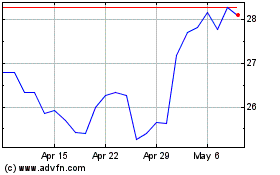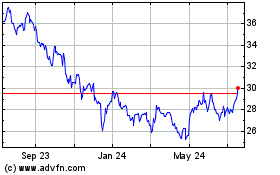Pfizer Raises Earnings Projections -- Update
April 30 2019 - 4:00PM
Dow Jones News
By Jared S. Hopkins
Pfizer Inc.'s new portfolio of prescription drugs lifted sales
during the first quarter as the company said it continues to make
progress on growing through its internal pipeline.
Shares of Pfizer rose 3% Tuesday afternoon as the company
reported better-than-expected sales and earnings.
The New York-based drugmaker, the largest in the U.S. by
revenue, is working on a two-year-old plan to get approval by 2022
on 15 new drugs or indications that have the potential to generate
$1 billion in annual sales. Chief Executive Albert Bourla, who
began running the company in January, said Tuesday that he is
encouraged by the success of many drugs currently in clinical
trials, noting that only two trials have been discontinued.
"I'm very happy with the progress," Mr. Bourla said in an
interview.
For example, Tafamidis, which treats patients with a rare
condition that can lead to heart failure, may be approved by U.S.
regulators later this year and reach the market shortly afterward.
There are as many as 500,000 patients world-wide who have the
disease known as transthyretin cardiomyopathy, but fewer than 1%
have been diagnosed.
Pfizer also is looking at possible deals. Chief Business Officer
John Young said on a conference call with analysts that Pfizer is
targeting firms with early- to mid-stage assets. Mr. Young said
such deals are riskier than buying companies with commercial drugs
or ones farther along in development, but they also limit any
potential disruption to the company's pipeline.
He said the value of a bolt-on deal the company would consider
would be "a few billion."
For the first quarter, Pfizer reported a profit of $3.88
billion, or 68 cents a share, compared with a profit of $3.56
billion, or 59 cents a share, a year earlier. Excluding special
items, Pfizer posted adjusted earnings of 85 cents a share. Citing
the first-quarter results, the company also raised its full-year
projections for adjusted per-share earnings by a penny.
Pfizer's sales increased 2% from a year earlier to $13 billion.
Sales in Pfizer's innovative division of new drugs, which includes
prostate cancer treatment Xtandi and blood thinner Eliquis, grew by
3%, led mostly by an increase in its international markets.
Breast-cancer treatment Ibrance led the company's growing
oncology division, with sales up 21% to $1.1 billion. Pfizer
credited strong uptake after the drug hit some markets outside the
U.S., and analysts expect Ibrance to become Pfizer's top-selling
treatment by 2022.
Beyond 2022, the drugmaker expects a new slate of experimental
drugs to complete clinical trials with hopes of eventually filing
for regulatory approval. They include drugs for treating diabetes
and liver ailments as well as gene therapies, cutting-edge
treatments that aim to replace defective genes with healthy ones.
In March, Pfizer made another bet on the space when it said it
would pay for the rights for gene therapies being developed at
French company Vivet Therapeutics.
Mr. Bourla also left open the possibility of separating Pfizer's
segment that makes off-patent and generic prescription drugs,
including cholesterol-controlling Lipitor pills. Mr. Bourla said he
was satisfied with the recent performance of the division, now
called Upjohn, which includes more than 20 drugs.
Sales for the division fell about 1% from the year-ago period to
$3.1 billion. Growth came from emerging markets such as China but
was offset by pricing challenges that have afflicted the
industry.
Pfizer considered splitting into two companies before deciding
against it in 2016. But as the generic pricing pressures continue
to challenge the industry, companies like Mallinckrodt
Pharmaceuticals and Perrigo plan to split off their divisions that
make generic medicines.
Mr. Bourla said he expected low-single-digit revenue growth for
the Upjohn division once it absorbs the expiration of pain medicine
Lyrica's patent protection. In June, Pfizer expects to lose the
protection, and it could begin to face generic competition. Lyrica
posted sales of nearly $5 billion last year.
Pfizer's consumer health-care division, which includes products
like Centrum vitamins and ChapStick lip balm, fell 2% to $858
million. The company plans to combine the division with a similar
one from GlaxoSmithKline PLC, in a deal slated to close in the
second half of this year. The venture eventually will be spun
off.
--Kimberly Chen contributed to this article.
Write to Jared S. Hopkins at jared.hopkins@wsj.com
(END) Dow Jones Newswires
April 30, 2019 15:45 ET (19:45 GMT)
Copyright (c) 2019 Dow Jones & Company, Inc.
Pfizer (NYSE:PFE)
Historical Stock Chart
From Mar 2024 to Apr 2024

Pfizer (NYSE:PFE)
Historical Stock Chart
From Apr 2023 to Apr 2024
